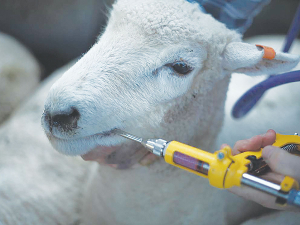Gordon Levet is a Northland sheep farmer and ram breeder who has spent a lifetime breeding sheep for worm resistance and facial eczema (FE) tolerance. He began breeding for worm resistance in 1987, recognising that there was a genetic component to a sheep's ability to tolerate worms and this has shaped his thinking on the issue...
After 34 years of breeding for the worm resistant trait there have been no guidelines to follow.
So far as I know, no individual or scientific establishment has succeeded in breeding sheep that have a moderate to high resistance to worm challenges.
For me it has been a fascinating journey into the unknown with some unexpected and pleasing results.
My thinking has evolved with the study of the data from about 25,000 faecal samples taken for a laboratory to count worm eggs. We have taken two or three samplings each year, a month apart, over the peak of the worm challenge.
Since 2007, these ram lambs were never drenched. About 400 ram lambs by 10 sires were involved. This provided valuable information on how the progeny of each sire were performing under a high challenge.
In nature, the immune system of animals evolves to a level where it would control diseases, infection resulting from injury and internal parasites. The health issues of sheep and goats would have been minimal where they roamed in small groups over vast areas of mountainous, arid regions of southern Europe and Asia. Their immune system evolved to meet these low challenges.
And then man became involved, reprogramming domestic animals by selective breeding to produce increased volumes of quality food and fibre. In doing so, large mobs were grazed on confined areas creating the ideal environment for diseases and worms to profligate.
Scientists had two options for a solution. Reducing worms via drenching with chemicals or breeding for a stronger immune system to control the greater challenge. They chose the former option as it was more readily achievable. Selective breeding for worm resistance would take at least 25 years parasitologists believed.
The chemical solution worked well over the past seven decades. However, it had a downside in two respects. The over-use of drenching decreases the effectiveness of each chemical used and super worms evolved able to resist all chemicals and combinations.
Another negative was that the most susceptible animals survived and were indistinguishable from their resistant sisters and entered the breeding flock. Ditto rams in ram breeding flocks.
The net result, a much more worm-susceptible flock having to face increased challenges from super worms.
Over my lifetime, the lethal Barbers’ Pole worm has become more of a problem in my area. Seventy years ago this worm was a problem in the late summer-autumn period, or the months of February until April.
However, this worm has now evolved to be a problem all the year. My Down breeds, adults and lambs, have to be drenched every six weeks otherwise there are losses.
Why has this happened? Warmer winters haven’t helped. It could be the result of super worms evolving, or it could be the natural result of the huge increase in worm populations due to our modern farming methods, where deviants occur, as is presently happening with Covid. Or more likely, a combination of factors, known or unknown.
The immune system is the key to breeding for worm resistance and I now believe it is quite different to all the other traits we breed for, be they production traits, physical, survival, breed type or behavioural.
All these we need to continually breed for, otherwise they will regress and eventually be lost.
On the other hand, the immune system in nature evolves to a level it can control disease and internal parasite challenges. It then fluctuates up or down, according to the normal environmental changes in challenge. It is a normal, natural process.
However, the huge increase of worm challenges with modern farming is way beyond the normal variation and the immune system fails. Sheep that have been bred to have a high degree of resistance will then fluctuate according to seasonal variation, as happens in nature at the lower level.
At this point, there would be no point in continuing to breed for the worm resistant trait, as the immune system would stabilise at this higher level.
I have taken into account what had happened to sheep when they escaped from the early French settlers of Louisiana in the US several hundred years ago. These feral sheep adapted to the sub-tropical climate – whereas the farmed Suffolk sheep are severely challenged by the Barbers’ Pole worm to the extent that unweaned lambs need to be drenched to keep them alive. The feral sheep are completely immune to all worm species and self-regulate according to challenge variations.
When worm resistance becomes more established in New Zealand, I believe the immune system will adjust to the level of worm challenge present in a specific region. In effect, the immune system would be much stronger in regions in the north and considerably less so in southern areas.
Much of what I have written are my opinions based on practical experience, but there are some facts that are not disputed:
Triple drench resistance is an increasing problem that will challenge sheep farming.
Climate change and particularly warmer winters will be favourable for the Barbers’ Pole worm to become more dominant in southern areas. This also applies to fungi that produce toxins and other health issues that have plagued sheep farmers in the north.
A new effective drench is unlikely to be produced for economic regions.
The good news is that when the genetic option is chosen to control worm challenges, it is permanent with no costs and a winner for consumers.



















